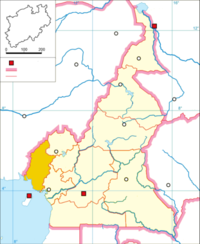Cameroonian English
| Cameroon English | |
|---|---|
| Region | Cameroon |
Native speakers | 17 million Anglophone Cameroonian (2011)[1] |
Language family | Indo-European
|
Early forms | Old English
|
Writing system | Latin (English alphabet) Unified English Braille |
| Official status | |
Official language in |  Cameroon Cameroon |
| Language codes | |
| ISO 639-1 | en |
| ISO 639-2 | eng |
| ISO 639-3 | eng |
| Glottolog | came1256 |
| IETF | en-CM |
| This article contains IPA phonetic symbols. Without proper rendering support, you may see question marks, boxes, or other symbols instead of Unicode characters. For an introductory guide on IPA symbols, see Help:IPA. | |
| Part of a series on the |
| English language |
|---|
| Topics |
| Advanced topics |
| Phonology |
| Dialects |
|
| Teaching |
|
Cameroon English is an English dialect spoken predominantly in Cameroon, mostly learned as a second language.[2] It shares some similarities with English varieties in neighbouring West Africa, as Cameroon lies at the west of Central Africa.[3] It is primarily spoken in the Northwest and Southwest regions of Cameroon.[4]
|
|
|
It is a postcolonial variety of English, long in use in the territory (Southern Cameroons, now split into Northwest and Southwest). Over the years, it has developed characteristic features, particularly in lexis but also in phonology and grammar. Those characteristics were once regarded as errors but are now increasingly accepted as distinctive Cameroonian contributions to the English language.
Phonological features
The phonemes /ɔː/, /ʌ/ and /ɒ/ tend to merge to /ɔː/, making "cot", "caught" and "cut" homophones.[2] Similarly, "lock" and "luck" are pronounced alike. And "white-collar worker" sometimes becomes "white-colour worker" in Cameroon.[5]
Expressions
Characteristic turns of phrase in the country or local coinages:[5]
- "detailly" = in detail
- "to see with me" = to agree with me; to see my point of view
- "installmentally" = by installments
- "of recent" = recently; lately
See also
- Languages of Cameroon
- Cameroonian French
- Cameroonian Pidgin English
- Camfranglais (when mixed with French)
- Anglophone Cameroonian
- Anglophone problem (Cameroon)
References
- ^ Georg Wolf, Hans (2001). English in Cameroon. New York. ISBN 9783110170535.
{{cite book}}: CS1 maint: location missing publisher (link) - ^ a b Pearce, Michael (10 September 2012). The Routledge Dictionary of English Language Studies. Routledge. p. 200. ISBN 978-1-134-26428-5.
- ^ Kouega (2007): "Cameroon is a Central African country whose variety of English shares a number of features with West African Englishes."
- ^ Anchimbe, Eric A. "Multilingual backgrounds and the identity issue in Cameroon." Anuario del Seminario de Filología Vasca" Julio de Urquijo" 39.2 (2011): 33-48.
- ^ a b Todd, Loreto (1982). Cameroon. Varieties of English Around the World. John Benjamins Publishing. p. 83. ISBN 90-272-8670-1.
- https://web.archive.org/web/20060917043540/http://www2.univ-reunion.fr/~ageof/text/74c21e88-656.html
Further reading
- Kouega, Jean-Paul (2007). A Dictionary of Cameroon English Usage. New York: Peter Lang. ISBN 978-3-03911-027-8.
- Kouega, Jean-Paul (1999). Some Major Speech Traits of Cameroon Media News in English. English Studies 80(6), 540-555
- Kouega, Jean-Paul (2000). Some Aspects of Cameroon English Prosody. Alizes, 19, 137-153
- Kouega, Jean-Paul (2003). Influence of Contacts between Western and African Cultures on English in Cameroon. Proceedings of the Unifying Aspects of Cultures conference at Vienna, Austria, November 7–9.
- In: TRANS. Internet-Zeitschrift für Kulturwissenschaften. No. 15/2003, (2003). WWW: http://www.inst.at/trans/15Nr/07_2/kouega15.htm[permanent dead link].
- Kouega, Jean-Paul (2005). The Effects of French on English L2 in Cameroon. In J. Cohen, K. T. McAlister, K. Rolstad, and J. MacSwan (Eds.) ISB4: Proceedings of the 4th International Symposium on Bilingualism (pp. 1201–1210). Somerville, MA, USA: Cascadilla Press.
- Kouega, Jean-Paul, (2006). Aspects of Cameroon English Usage: A Lexical Appraisal. Muenchen, Germany: Lincom Europa. ISBN 3-89586-877-9
- Kouega, Jean-Paul (2006c). Interplay of Accent and Orthography in L2 English in Cameroon. Annals of the Faculty of Arts, Letters and Social Sciences, University of Yaounde 1(5), 183-197
- Kouega, Jean-Paul (2007). Forenames in Cameroon English speech. The International Journal of Language, Society and Culture, 23, 32–46.
- Talla Sando Ouafeu Yves (2006). Intonational meaning in Cameroon English discourse: a sociolinguistic perspective. Goettingen: Cuvillier Verlag
This article about the English language is a stub. You can help Wikipedia by expanding it. |
- v
- t
- e
 | This Cameroon-related article is a stub. You can help Wikipedia by expanding it. |
- v
- t
- e













